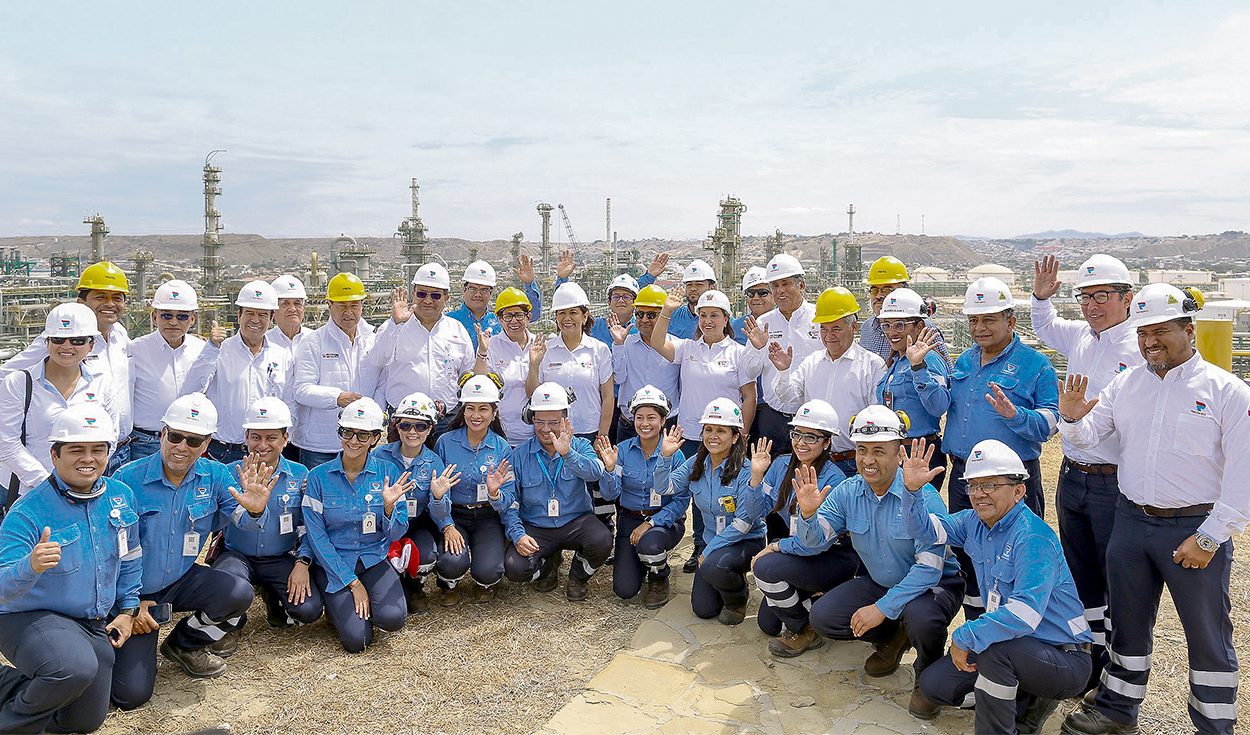
The full operation of the New Talara Refinery (NRT) will allow Petroperu generate, together with the exploitation of lots I, VI and Z-2B in the northwest, an annual EBITDA of US$540 million, amount greater than US$350 million that each year pays for debts which include the modernization of the complex itself.
During the inauguration ceremony, President Dina Boluarte highlighted that the NRT, licensed by ExxonMobil and with technology present in only eight other refineries in the world, has the crucial role of leveraging downward fuel prices in the domestic market.
In this sense, Boluarte highlighted that the 100% operation of the NRT “will contribute to the reduction of fuel imports”, a situation that will allow the market to depend less and less on imports and the “game of international prices.”
“We are facing one of the most modern deep conversion refineries on the southern Pacific coast and one of the nine in the world with FCK technology. The full implementation of the work goes hand in hand with the repowering of Petroperú and the strengthening of its human resources,” said the president.
Furthermore, with the NRT 100%, it is now in a position to take advantage of the heavy crude oil from the jungle and the light crude oil from Talara. Before, the first was only exported. For this reason, the oil company has received interest from other countries, such as Ecuador, that seek to commercially maximize residuals in their facilities.
This position was supported by the president of the oil company, Pedro Chira, who stressed that one of the objectives will be to recover its 33% share in the local fuel market by the first quarter of 2024.
Asphalt in diesel
Currently, the NRT has a capacity of 95,000 bpd. However, it does not work with more than 85,000 bpd on average because it does not have enough market to place its production. While it was modernizing, companies like Repsol gained ground that it is now seeking to retake. The head of Energy and Mines, Oscar Veraexplained that the Flexicoking (FCK) unit will allow converting asphalt into diesel.
“Together with the Fluidized Catalytic Cracking (FCC) unit, they will give the company the profitability of taking advantage of waste and giving it high value,” said the head of Minem.
Vertical integration
Although the refining margin has decreased in recent months internationally, Petroperú will use its other business unit, the operation in its own batches, to honor its commitments.
After successfully recovering lots I, VI and Z-2B, the oil company has maintained and even increased the production level at times, until achieving a combined output of 7,200 barrels per day (bpd).
In the opinion of the mayor of Talara, Sigifredo Zárate Vite, the temporary operation of the three lots until 2025 “should have been for 30 years, as the other contracts have been generated.”
Petroperú had anticipated that a two-year contract would prevent it from carrying out exploration work in Lot Z-2B, which was going to become Lot-69 with new areas for that purpose.
Recently, the National Society of Mining, Petroleum and Energy (SNMPE) revealed to a local media that the position of the Peruvian Government is also to hand over the operation of Lot X, the largest in Talara (70% of local crude oil production), to Petroperú. It remains to be determined whether it will be via a 2-year temporary contract.
The key
Goal. Petroperú will develop new production areas from 2Q2024 in the jungle. The partner will be called for Lot 64 next summer, while in Lot 192 progress is being made with recovering the assets.
Corporation. The new directors of Petroperú must also be chosen by meritocratic competition starting next year.
Reactions
Dina Boluarte, president of the Republic
“The NRT will increase the production of clean fuels to supply the north, center, south and east of the country. Besides, will attract investments to Peru in the energy and hydrocarbon sector”.
Óscar Vera Gargurevich, Minister of Energy and Mines
“NRT fuel prices will be set by supply and demand in the international market. However, by having more efficient processes, more competitive rates can be offered.”
Source: Larepublica
Alia is a professional author and journalist, working at 247 news agency. She writes on various topics from economy news to general interest pieces, providing readers with relevant and informative content. With years of experience, she brings a unique perspective and in-depth analysis to her work.












